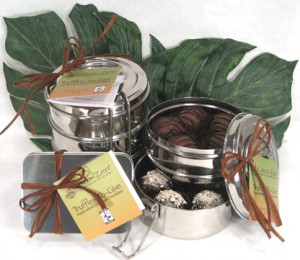Walking into winter months when jackets and scarves become a necessity, a bold pair of Fair Trade earrings is an easy way to maintain your personal style, uplift your spirit, and participate in the greater economic good. This season Global Exchange‘s offering of Fair Trade earrings are fantastic!
Global Exchange in Berkeley has so many beautiful earrings to choose from in a variety of materials, styles and colors. Lucky me, shop manager, I get to share my favorite five with you!
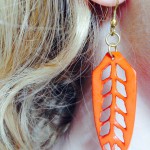 1. Hand made in India, these earrings are carved from bone. In warm orange and festive fuchsia, they are light weight, chic and fun to pair with jeans and a big sweater or a little black dress ($14.50) Fun Fact: all Global Exchange earring hooks are either sterling silver or surgical steel.
1. Hand made in India, these earrings are carved from bone. In warm orange and festive fuchsia, they are light weight, chic and fun to pair with jeans and a big sweater or a little black dress ($14.50) Fun Fact: all Global Exchange earring hooks are either sterling silver or surgical steel.
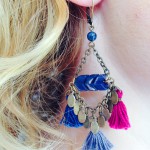 2. Handmade in Guatemala from Geo cut semi- precious stones, cotton tassels, bronze metal leaves and brass chains, these unique earrings are a show stopper. We carry these exotic beauties in a blue and green color way, they are a perfect way to spice things up ($32.50)
2. Handmade in Guatemala from Geo cut semi- precious stones, cotton tassels, bronze metal leaves and brass chains, these unique earrings are a show stopper. We carry these exotic beauties in a blue and green color way, they are a perfect way to spice things up ($32.50)
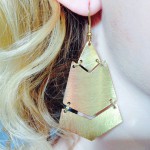 3. Handmade in India these bold, brushed, brass earrings are not only a sustainable metal alternative to gold, they are light weight with a big personality and can pair with just about anything ($18.50) Fun Fact: Brass will always shine to a brilliance.
3. Handmade in India these bold, brushed, brass earrings are not only a sustainable metal alternative to gold, they are light weight with a big personality and can pair with just about anything ($18.50) Fun Fact: Brass will always shine to a brilliance.
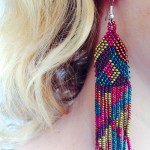 4. Handmade in Guatemala these elegant earrings are intricately woven in interesting patterns with rich colored, glass beads. These beads feel nice on your neck and the vibrant colors really pop. We carry these beauties in a variety of colors! ($32.50)
4. Handmade in Guatemala these elegant earrings are intricately woven in interesting patterns with rich colored, glass beads. These beads feel nice on your neck and the vibrant colors really pop. We carry these beauties in a variety of colors! ($32.50)
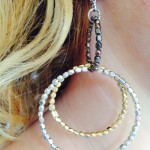 5. Hand made in India these mod earrings are made of cube shaped beads in silver, gold and gunmetal hoops that dance together when hanging from your ear. Their elegant sparkle is perfect for New Years Eve! $16.50
5. Hand made in India these mod earrings are made of cube shaped beads in silver, gold and gunmetal hoops that dance together when hanging from your ear. Their elegant sparkle is perfect for New Years Eve! $16.50
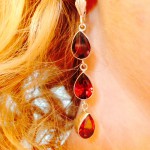 **Bonus **I know, I said top 5 but I have to throw in some beautiful Balinese, 3 tear drop, semi-precious, Garnets in sterling silver! Perfect for the ballet,symphony or opera, these one of a kind treasures are deep in color and timeless treasures. ($85)
**Bonus **I know, I said top 5 but I have to throw in some beautiful Balinese, 3 tear drop, semi-precious, Garnets in sterling silver! Perfect for the ballet,symphony or opera, these one of a kind treasures are deep in color and timeless treasures. ($85)
Whether its a gift for family, a friend or yourself, Global Exchange offers earrings in all lengths, from edgy studs to elegant drops to swaying hoops, it was a challenge to choose only 5! You should come in, I just finished lighting our cloth lanterns, decorating our trees with ornaments and filling our jewelry cases!

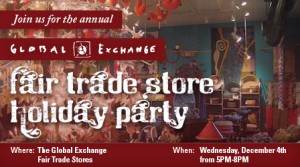

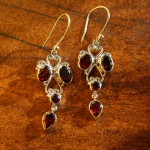
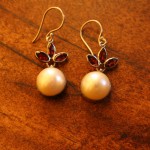
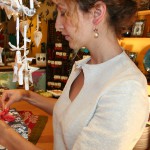
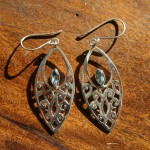
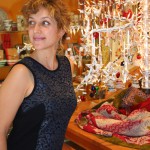 In preparation for our photo shoot, Fair Trade Stores Program Director Jocelyn Boreta and I walked into LOFT1513 to pick out some beautifully crafted party dresses. We were inspired by the independent spirt of the space, and encouraged by intern and designer Noel to try a few on that you see here.
In preparation for our photo shoot, Fair Trade Stores Program Director Jocelyn Boreta and I walked into LOFT1513 to pick out some beautifully crafted party dresses. We were inspired by the independent spirt of the space, and encouraged by intern and designer Noel to try a few on that you see here. TAKE ACTION!
TAKE ACTION!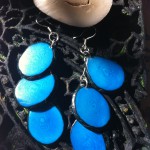
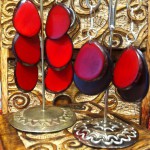
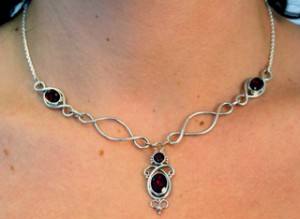
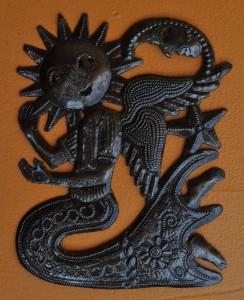

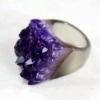
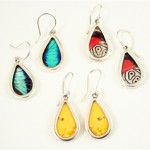 Peruvian
Peruvian 